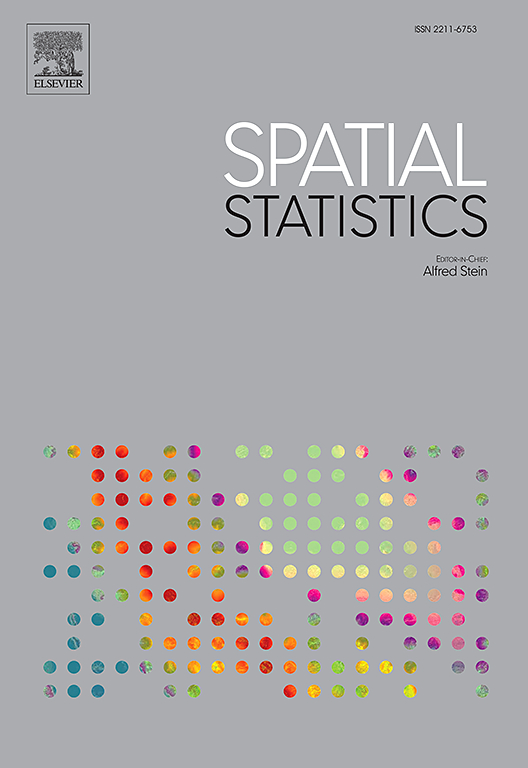Bayesian geographically weighted regression using Fused Lasso prior
IF 2.1
2区 数学
Q3 GEOSCIENCES, MULTIDISCIPLINARY
引用次数: 0
Abstract
A main purpose of spatial data analysis is to predict the objective variable for the unobserved locations. Although Geographically Weighted Regression (GWR) is often used for this purpose, estimation instability proves to be an issue. To address this issue, Bayesian Geographically Weighted Regression (BGWR) has been proposed. In BGWR, by setting the same prior distribution for all locations, the coefficients’ estimation stability is improved. However, when observation locations’ density is spatially different, these methods do not sufficiently consider the similarity of coefficients among locations. Moreover, the prediction accuracy of these methods becomes worse. To solve these issues, we propose Bayesian Geographically Weighted Sparse Regression (BGWSR) that uses Bayesian Fused Lasso for the prior distribution of the BGWR coefficients. Constraining the parameters to have the same values at adjacent locations is expected to improve the prediction accuracy at locations with a low number of adjacent locations. Furthermore, from the predictive distribution, it is also possible to evaluate the uncertainty of the predicted value of the objective variable. By examining numerical studies, we confirmed that BGWSR has better prediction performance than the existing methods (GWR and BGWR) when the density of observation locations is spatial difference. Finally, the BGWSR is applied to land price data in Tokyo. Thus, the results suggest that BGWSR has better prediction performance and smaller uncertainty than existing methods.
基于融合Lasso先验的贝叶斯地理加权回归
空间数据分析的一个主要目的是预测未观测位置的客观变量。虽然地理加权回归(GWR)经常用于此目的,但估计不稳定性被证明是一个问题。为了解决这个问题,贝叶斯地理加权回归(BGWR)被提出。在BGWR中,通过对所有位置设置相同的先验分布,提高了系数估计的稳定性。然而,当观测点密度在空间上不同时,这些方法没有充分考虑到观测点间系数的相似性。而且,这些方法的预测精度变差了。为了解决这些问题,我们提出了贝叶斯地理加权稀疏回归(BGWSR),该回归使用贝叶斯融合套索进行BGWR系数的先验分布。约束参数在相邻位置具有相同的值有望提高相邻位置数量较少的位置的预测精度。此外,从预测分布中还可以评估目标变量预测值的不确定性。通过数值研究证实,当观测位置密度存在空间差异时,BGWSR的预测性能优于现有方法(GWR和BGWR)。最后,将BGWSR应用于东京地价数据。结果表明,与现有方法相比,BGWSR具有更好的预测性能和更小的不确定性。
本文章由计算机程序翻译,如有差异,请以英文原文为准。
求助全文
约1分钟内获得全文
求助全文
来源期刊

Spatial Statistics
GEOSCIENCES, MULTIDISCIPLINARY-MATHEMATICS, INTERDISCIPLINARY APPLICATIONS
CiteScore
4.00
自引率
21.70%
发文量
89
审稿时长
55 days
期刊介绍:
Spatial Statistics publishes articles on the theory and application of spatial and spatio-temporal statistics. It favours manuscripts that present theory generated by new applications, or in which new theory is applied to an important practical case. A purely theoretical study will only rarely be accepted. Pure case studies without methodological development are not acceptable for publication.
Spatial statistics concerns the quantitative analysis of spatial and spatio-temporal data, including their statistical dependencies, accuracy and uncertainties. Methodology for spatial statistics is typically found in probability theory, stochastic modelling and mathematical statistics as well as in information science. Spatial statistics is used in mapping, assessing spatial data quality, sampling design optimisation, modelling of dependence structures, and drawing of valid inference from a limited set of spatio-temporal data.
 求助内容:
求助内容: 应助结果提醒方式:
应助结果提醒方式:


